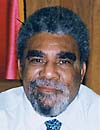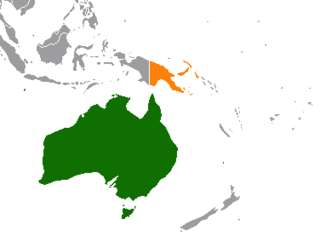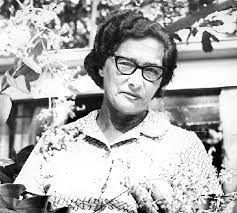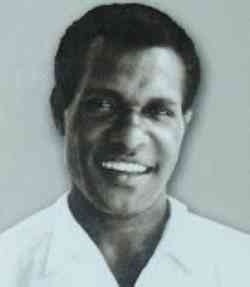
Port Moresby, also referred to as Pom City or simply Moresby, is the capital and largest city of Papua New Guinea. It is one of the largest cities in the southwestern Pacific outside of Australia and New Zealand. It is located on the shores of the Gulf of Papua, on the south-western coast of the Papuan Peninsula of the island of New Guinea. The city emerged as a trade centre in the second half of the 19th century. During World War II, it was a prime objective for conquest by the Imperial Japanese forces during 1942–43 as a staging point and air base to cut off Australia from Southeast Asia and the Americas.
The Pangu Party or Papua and Niugini Union Pati is a political party in Papua New Guinea. As of September 2019, the party had 23 of 111 seats in the National Parliament.

Sir Mekere Morauta was a Papua New Guinean politician and economist who served as the 7th Prime Minister of Papua New Guinea from 1999 to 2002. Inheriting a depressed economy and a fractious legislature, he embarked on fundamental reforms of the country's economy and political system.

The University of Papua New Guinea (UPNG) is a university located in Port Moresby, capital of Papua New Guinea. It was established by ordinance of the Australian administration in 1965. This followed the Currie Commission which had enquired into higher education in Papua New Guinea. The University of Papua New Guinea Act No. 18, 1983 bill repealing the old Ordinance was passed by the National Parliament in August 1983.

Sir Michael Thomas Somare was a Papua New Guinean politician. Widely called the "father of the nation", he was the first Prime Minister after independence. At the time of his death, Somare was also the longest-serving prime minister, having been in office for 17 years over three separate terms: from 1975 to 1980; from 1982 to 1985; and from 2002 to 2011. His political career spanned from 1968 until his retirement in 2017. Besides serving as PM, he was minister of foreign affairs, leader of the opposition and governor of East Sepik Province.

Foreign relations exist between Australia and Papua New Guinea. Papua New Guinea is Australia's closest neighbour and a former colony of Australia. Both nations share the same continent. Papua New Guinea has developed much closer relations with Australia than with Indonesia, the only country with which it shares a land border. The two countries are Commonwealth realms. In contemporary times, Papua New Guinea is one of the largest recipients of Australian aid. Critics have pointed to instances where this has led to an outsized Australian influence on Papua New Guinea politics.
Michael John Manning OBE was an Australian-born Papua New Guinean anti-corruption activist and economist. Manning served as the second Chairman of Transparency International PNG (TIPNG), one of Papua New Guinea's largest organizations dedicated to eradicating corruption, from 2003 until 2008. He was a naturalized citizen of Papua New Guinea.
Cherubim Alfred Dambui, was a Papua New Guinea politician and Roman Catholic bishop. Dambui became the first Sepik to be ordained a Catholic priest in 1974 and served as the first premier of East Sepik Province beginning in 1976. Dambui also served as the auxiliary bishop of the Roman Catholic Archdiocese of Port Moresby, Papua New Guinea.
Sogeri town is the headquarters of the Sogeri Sub-District of the Kairuku-Hiri District in the Central Province of Papua New Guinea. It is located in the mountains eastward from Port Moresby and is situated in the Sogeri Plateau at about 500m above sea level. It is connected to Port Moresby by Sogeri Road. The town is near the famous Kokoda Trail. Sogeri has a rural hospital, a police station, some stores and a supermarket. It also has a fruit and vegetable market. The town also has an Elementary School, a Primary School and two Secondary Schools. Sogeri is also home to a couple of parks, scenic sightseeing areas, beautiful picnic places and rivers. The Sogeri sub-district has five hotels. Sogeri Lodge, Kokoda Trail Hotel and Koitaki Country Club are situated in the Upper Sogeri area. Two others are situated at the Lower Sogeri area, which includes Bluff Inn.
Oala Oala-Rarua was a Papua New Guinean educator, civil servant, trade unionist, politician and diplomat. He served as a member of the House of Assembly and Assistant Minister for the Treasury between 1968 and 1972, later becoming the first Lord Mayor of Port Moresby and High Commissioner to Australia.

Andrée Millar was an Australian botanist who played an important role in the development of the botanical gardens of Papua New Guinea (PNG) and published a book on the orchids of PNG. An orchid, Dendrobium Andrée Millar, was named after her.

Dame Jean Lucilla Kekedo is a Papua New Guinean activist who has held senior roles in the country's public service, including that of Ombudsman and High commissioner to the United Kingdom.

Sir Anthony Siaguru was a Papua New Guinean civil servant, lawyer, international diplomat, politician, sportsman and anti-corruption campaigner.
The Gang of Four in Papua New Guinea (PNG) were four influential young public servants who played an important role in the planning and development of the country immediately after the country's independence from Australia in 1975.
Sir Cecil Abel (1903–1994) was a missionary, teacher and politician, initially in the Territory of Papua and, from 1975, in the independent nation of Papua New Guinea (PNG). He played an important role in the independence process and is said to have been responsible for the preamble to PNG's constitution. He also played a leading role in the early stages of the Pangu Party, the party that formed the government under prime minister Michael Somare after independence.

Sir Joseph Nombri was a politician, administrator and diplomat in Papua New Guinea (PNG). He played an important role in events leading up to PNG's independence in 1975 and later became the country's ambassador in Tokyo.

Sir Pita Lus was an outspoken Papua New Guinean politician who played an important role in the country's independence in 1975 and is credited with having persuaded Michael Somare, the country's first prime minister, to run for parliament.

Sir Alkan Tololo was the director of Papua New Guinea's education department and the first Papua New Guinean to be chancellor of both the University of Papua New Guinea (UPNG) and the Papua New Guinea University of Technology (Unitech). He also became chancellor of Vudal University, as well as holding diplomatic posts in Australia and Malaysia.

Sir Ebia Olewale (1940–2009) was a politician in Papua New Guinea (PNG). He was elected as a member of the House of Assembly of Papua and New Guinea in 1968 and went on to hold several ministerial positions during the period of self-governance and after PNG's independence in 1975, including that of deputy prime minister. He was knighted in 1983 and served as chancellor of the University of Goroka from 2000 to 2006. From 2002 until his death, he was a director of the Papua New Guinea Sustainable Development Program.
Passam National High School is one of the six government-run national high schools in Papua New Guinea (PNG), which are also known as "schools of excellence". It is a coeducational school for Grades 11 and 12 and has a student population of around 600, consisting of both boarders and day-students. In 2020 and 2021 it was ranked as the top national high school in the country, based on exam results.












